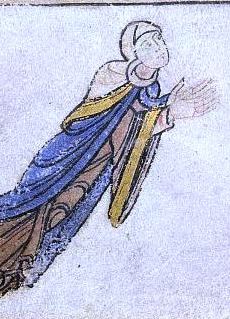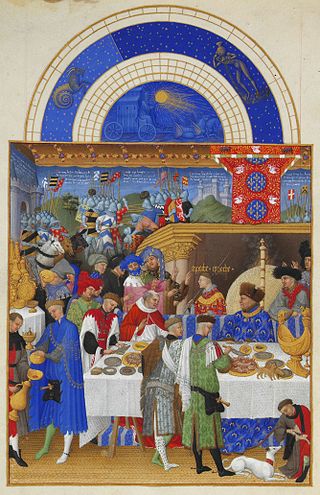Related Research Articles

Adeliza of Louvain was Queen of England from 1121 to 1135 as the second wife of King Henry I.
May McKisack was an Irish medievalist and academic. She was a professor of history at the University of London's Westfield College and at the University of Oxford in Somerville College. She was the author of The Fourteenth Century (1959) in the Oxford History of England.

Gong farmer was a term that entered use in Tudor England to describe someone who dug out and removed human excrement from privies and cesspits. The word "gong" was used for both a privy and its contents. As the work was considered unclean and off-putting to the public, gong farmers were only allowed to work at night, hence they were sometimes known as nightmen. The waste they collected, known as night soil, had to be taken outside the city or town boundary or to official dumps for disposal.
Wendy Elizabeth Davies is an emerita professor of history at University College London, England. Her research focuses on rural societies in early medieval Europe, focusing on the regions of Wales, Brittany and Iberia.
Dame Ann Marilyn Strathern, DBE, FBA is a British anthropologist, who has worked largely with the Mount Hagen people of Papua New Guinea and dealt with issues in the UK of reproductive technologies. She was William Wyse Professor of Social Anthropology at the University of Cambridge from 1993 to 2008, and Mistress of Girton College, Cambridge from 1998 to 2009.
Joan Mahoney is a legal scholar and former dean of two law schools. She served as Dean at Wayne State University Law School in Detroit, Michigan, from 1998 to 2003, the first woman law school dean in Michigan and one of the very few women in the United States to have held the deanship at two different law schools. Prior to her tenure as Dean at Wayne State, she served from 1994 to 1996 as Dean of Western New England College School of Law in Springfield, Massachusetts..
Barbara Yorke FRHistS FSA is a historian of Anglo-Saxon England, specialising in many subtopics, including 19th-century Anglo-Saxonism. She is currently emeritus professor of early Medieval history at the University of Winchester, and is a fellow of the Royal Historical Society. She is an honorary professor of the Institute of Archaeology at University College London.

The medieval household was, like modern households, the center of family life for all classes of European society. Yet in contrast to the household of today, it consisted of many more individuals than the nuclear family. From the household of the king to the humblest peasant dwelling, more or less distant relatives and varying numbers of servants and dependents would cohabit with the master of the house and his immediate family. The structure of the medieval household was largely dissolved by the advent of privacy in early modern Europe.
Dorothee Metlitzki was a Russian-born American author and professor of English at the University of California, Berkeley and, for most of her career, at Yale University. She was a specialist in medieval English literature and history, Arabic literature and language and of the author Herman Melville.

Mary Lee Hu is an American artist, goldsmith, and college educator, known for using textile techniques to create intricate woven wire jewelry.

Women in the Middle Ages in Europe occupied a number of different social roles. Women held the positions of wife, mother, peasant, warrior, artisan, and nun, as well as some important leadership roles, such as abbess or queen regnant. The very concept of women changed in a number of ways during the Middle Ages, and several forces influenced women's roles during this period, while also expanding upon their traditional roles in society and the economy. Whether or not they were powerful or stayed back to take care of their homes, they still played an important role in society whether they were saints, nobles, peasants, or nuns. Due to context from recent years leading to the reconceptualization of women during this time period, many of their roles were overshadowed by the work of men. Although it is prevalent that women participated in church and helping at home, they did much more to influence the Middle Ages.
Leslie J. Workman was an independent scholar and founder of academic medievalism.
Eleanor Shipley Duckett was an English-born philologist and medieval historian who spent most of her career in the United States. For thirty years, she taught at Smith College. Duckett published a number of books with University of Michigan Press, mainly on European history, religious history, and saints, and was a reviewer for The New York Times Book Review. Initially, Duckett was known for writing accessible historical books on the Middle Ages; later, she acquired a reputation as an authority on early medieval saints. A devout Episcopalian, Duckett was the lifelong companion of novelist Mary Ellen Chase.
Judith MacKenzie Bennett is an American historian, Emerita Professor of History and John R. Hubbard Chair in British History at the University of Southern California. Bennett writes and teaches about medieval Europe, specifically focusing on gender, women's history, and rural peasants.
Anne Middleton was an American medievalist, and the Florence Green Bixby Professor of English at the University of California, Berkeley.
Mrinalini Sinha is the Alice Freeman Palmer Professor in the Department of History and Professor in the Departments of English and Women's Studies of the University of Michigan. She writes on various aspects of the political history of colonial India, with a focus on anti-colonialism and on gender. She was the president of the Association for Asian Studies, 2014–2015]]. She is the recipient of the 2012 John Simon Guggenheim Memorial Foundation Fellowship. She has served, and continues to serve, on the editorial board of several academic journals, including the American Historical Review, Past and Present,Gender and History, Journal of Imperial and Commonwealth History, Indian Economic and Social History Review, and History of the Present.
Barbara Ross-Lee, D.O. is an American physician, academic, and the first African-American woman to serve as dean of a U.S. medical school; she is also known as the sister of Diana Ross along with being the aunt of actress Tracee Ellis Ross, and singer-songwriters Rhonda Ross Kendrick and Evan Ross. She majored in biology and chemistry at Wayne State University, graduating in 1965. Then, in 1969, she entered Michigan State University's College of Osteopathic Medicine. Ross-Lee then went on to open her own private family practice, teach as a professor, and hold other positions within the medical community. In 1993, she was elected as the first woman dean of a medical school, at Ohio University's Heritage College of Osteopathic Medicine. She has earned several awards and honors for her work and accomplishments.

Delia Villegas Vorhauer was an American Latina social worker, who successfully ran programs to assist the Hispanic communities in Illinois, Ohio and Michigan. She was awarded a presidential medal for her efforts in development. She founded Mujeres Unidas de Michigan as an advocacy group for Spanish-speaking women and as a result of their activism the group sent six delegates to the 1977 National Women's Conference, which was a part of the UN International Women's Year programs. Vorhauer served as vice chair of the delegation to the conference. She authored the Mason Miller Report, an evaluation of minorities and higher education, which became the model for analyzing participation of minorities in colleges and universities throughout Michigan, leading to a state bi-lingual education law. When she lost her sight, due to diabetes, Vorhauer became an advocate for the blind. She was inducted into the Michigan Women's Hall of Fame in 1990, the first Latina to be honored in the hall.
Marjorie Keniston McIntosh is an American historian of Great Britain.
Sylvia Lettice Thrupp was an English-born, Canadian-American medievalist, comparative historian and social scientist. She is sometimes described as a "foremother of medievalists."
References
- 1 2 "Barbara A. Hanawalt | Department of History". history.osu.edu. Retrieved 2016-12-04.